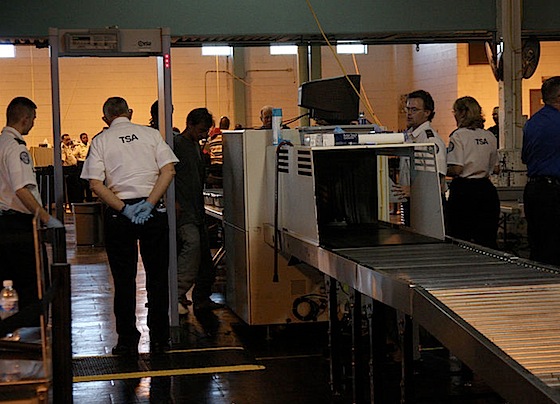If You Fly, This Plant Extract Could Save Your Life
May 11th 2014

Air travel, for anyone who regularly participates in this modern miracle of technology, can be both terrifying and exhilarating. Not only will you be lofted at speeds greater than 500 miles per hour into the lower reaches of the stratosphere (30,000–39,000 ft) where you will be exposed to DNA-damaging cosmic x-ray radiation, but before you are in the clouds, you will inevitably face a wide range of physiological stressors, such as manmade irradiation via whole-body imaging , the prospect of body searches, some of the world's most non-nutritious food, and the constant worry of missing your flight or connection. Is it any wonder that people experience jet lag, or much worse?
While all the health risks associated with modern air day travel are significant, especially when you add in the infectious disease risks associated with lackluster sanitation and jet fumes – which is one topic rarely discussed and so profoundly serious in its health implications that we can not do it justice here -- there is one deadly risk associated with air travel – particularly long haul flights[1] – which is perhaps most serious: venous thromboembolism (VTE).
The highly unnatural conditions of flight can result in increased risk of VTE, which is caused when a clot forms in a vein deep in the leg (deep vein thrombosis (DVT)) vein or vein in the lung (pulmonary embolism). VTE is believed responsible for 50,000 deaths annually in the United States alone.[2] But as is the case for so many modern day conditions that result from manmade causes, natural 'remedies' exist. Indeed, research indicates a plant extract named pycnogenol may provide an ideal preventive during air travel.

Pycnogenol is an extract derived from maritime pine tree bark, and is exceedingly rich in the plant compounds known as proanthocyanidins , which are also found in a number of common foods, from apples to cocoa, and cinnamon to grapes. What is so unique about pycnogenol is that it's extremely concentrated in these vital compounds, and has been specifically studied for preventing VT and other flight-associated health risks:
- Pycnogenol Reduces the Risk of Deep Vein Clots (Thrombosis): A 2004 study[3] found that pycnogenol (dosage: 100 mg ,two capsules between 2 and 3 hours before flights; two capsules were taken 6 hours after the flight, and one capsule the next day) administered to subjects on flights on average 8 hours and 15 minutes, resulted in zero deep vein thrombosis events, and only nonthrobotic, localized phlebitis (inflammation of a vein, usually in the legs), in the treatment group, with five thrombotic events (one DVT and four superficial thromboses) in the control group.
According to the study, "The ITT (intention to treat) analysis detects 13 failures in the control group (eight lost to follow up + five thrombotic events) of 105 subjects (12.4%) vs. five failures (4.7%; all lost, no thrombotic events) in the treatment group (p<0.025). No unwanted effects were observed.
The study concluded: "[T]his study indicates that Pycnogenol treatment was effective in decreasing the number of thrombotic events (DVT and SVT) in moderate-to-high risk subjects, during long-haul flights."
- Pycnogenol Reduces Ankle Swelling (Edema): A 2005 study,[4] which looked at the risk of edema (which is associated with increased risk of deep vein thrombosis) found that 100 mg of pycnogenol (two capsules between 2 and 3 hours before flights with 250 mL of water and two capsules 6 hours later with 250 mL of water and one capsule the next day), significantly reduced the risk of ankle swelling (a sign of edema).
According to the study, "After the in those treated with , the edema score was increased only by 17.9% (vs. an increase of 58.3% in the control group) (p<0.05). The RAS (a measure of ankle swelling), evaluated in 22 subjects in the Pycnogenol group (age 44.5; SD 8) and in 23 in the control group (age 45; SD 9) was increased on average by 91% in the control group and 36% in the Pycnogenol group (p<0.05). The variation on circumference at the ankle was 6% in the group (11% in the control group; p<0.05). These results indicate a positive effect of on edema during flights when considering subjective and objective data. No unwanted effects were observed."

Obviously, anything that can safely help you avoid deep vein thrombosis is promising, considering conventional approaches have serious side effects. Pycnogenol, however, is a powerful supplement and should and should be taken with caution – ideally, under the supervision of an integrative medical professional or medical herbalist– because it is anti-thrombotic and a blood thinner, much like aspirin. If you are already taking aspirin or a prescription blood thinner, combining pycnogenol could be dangerous – owing to the fact that aspirin by itself, like most pharmaceutical blood thinners, already carries a significant risk of hemorrhagic side effects , i.e. excessive bleeding. And therefore, adding pycnogenol on top of an already dangerous blood thinning chemical can have dire consequences.
With that said, it should be noted that a 1999 study found that pycnogenol was superior to aspirin in preventing platelet aggregation (a risk factor for pathological clotting) in smokers. According to the study, "...a single, high dose, 200 mg Pycnogenol, remained effective for over 6 days against smoking-induced platelet aggregation. Smoking increased platelet aggregation that was prevented after administration of 500 mg Aspirin and 125 mg Pycnogenol. Thus, smoking-induced enhanced platelet aggregation was inhibited by 500 mg Aspirin as well as by a lower range of 100-125 mg Pycnogenol."
Most saliently, "Aspirin significantly (p<0.001) increased bleeding time from 167 to 236 seconds while Pycnogenol did not. These observations suggest an advantageous risk-benefit ratio for Pycnogenol." In other words, pycnogenol was not only as effective as aspirin at preventing aggregation (at a lower dosage) but it reduced the risk of hemorrhagic side effects (excessive bleeding), clearly demonstrating its superiority over aspirin, and perhaps enabling those who are looking for a natural alternative to pharmaceutical blood thinners to 'free two birds with one hand.' For more information on this topic read "The Evidence Against Aspirin and For Natural Alternatives ."

There are two more compelling reasons why pycnogenol may be one of your most valuable air travel companions:
- Pycnogenol is Radioprotective.[5]-[6] This is relevant because according to the EPA's website, "About eight percent of our annual radiation exposure comes from outer space. The atmosphere shields us from cosmic radiation, and the more air that is between us and outer space, the more shielding we have. The closer we get to outer space, the more we are exposed to cosmic radiation. This holds true when we live at high altitudes or fly." Add in the largely unknown risks associated with whole-boding scanning devices at airport security, and taking a flight today may generate exposures as significant as radiation-based medical diagnostics – each time you fly.
- Pycnogenol is Supports Immunity. Flight involves subpar sanitation (have you ever seen a cleaning crew between flights?), and re-circulating air can increase the risk of exposure to airborne infections. Thankfully pycnogenol has been found to help fight off retrovirus infections in the animal model, [7] and there is indication that it has antibiotic properties, as demonstrated by an cell study on its ability to inhibit Helicobacter pylori.[8]
Finally, pycnogenol has been studied to fight jet-lag and the associated brain edema (yes, flying can make your brain swell). A 2008 study found that subjects given pycnogenol (50 mg tablets 3 times/day, for 7 days starting 2 days prior to the flight) experienced both significant reductions in jet-lag symptoms (reduced from 39.3 hours in the control group to 18.2 hours in the treatment group).[9] They also tested a separate group using brain CT scans in order to measure brain edema, in association with typical signs and symptoms, observed in previous published flight studies. The study found the "...difference between the Pycnogenol and the control groups was statistically significant (P<0.05) for all items assessed including the cerebral edema score obtained by CT scan. The short-term memory was significantly altered in the control group and associated to edema and swelling of the lower limbs. The score (and the level of edema) was comparatively higher in a subgroup of hypertensive subjects in the control group. Minor alterations of cardiac function were observed in association with de-stabilisation of blood pressure. Fatigue was also significantly higher in the control group in comparison with the Pycnogenol group. A number of spontaneously reported symptoms was also scored and there was a statistically significant difference (P<0.05) between the Pycnogenol and control groups. In conclusion, Pycnogenol was useful to control jet-lag and minimal brain edema."
While supplements like pycnogenol have powerful, evidence-based properties , it is always good to be reminded that optimizing your nutrition via whole, organic, traditionally prepared foods is always going to be your best bet for ensuring good health while traveling. On the other hand, it is always reassuring to know that Mother Nature provides effective, clinically tested solutions where no pharmaceutical one exists – that is, not without health risks that can be greater than the one(s) they are taken to prevent or treat.